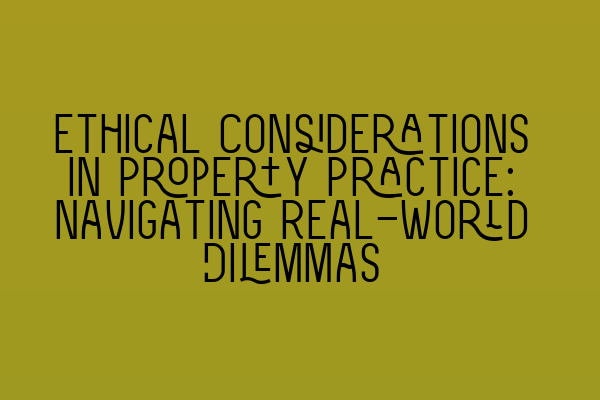Ethical Considerations in Property Practice: Navigating Real-World Dilemmas
As property law solicitors, we are faced with a myriad of ethical dilemmas in our daily practice. The decisions we make can have significant consequences for our clients and the wider community. It is essential that we navigate these dilemmas with care, keeping our ethical obligations at the forefront of our minds.
In this blog post, we will explore some of the common ethical considerations that arise in property practice and discuss strategies for approaching and resolving these dilemmas in an ethical manner. We will also highlight the importance of ongoing professional development and staying informed about changes in property law and regulations.
Conflicts of Interest
One of the fundamental ethical considerations in property practice is managing conflicts of interest. As solicitors, we owe a duty of loyalty to our clients, and it is essential that we avoid conflicts that could compromise our ability to represent each client’s best interests impartially.
For example, if you are acting for both the buyer and seller in a property transaction, you must disclose this dual representation to both parties and obtain their informed consent. Additionally, you may need to put in place appropriate safeguards to ensure that each client’s interests are protected and that confidential information is not improperly disclosed.
It is important to maintain a clear and transparent line of communication with all parties involved in the transaction. This helps to ensure that everyone understands their rights, responsibilities, and the potential conflicts of interest that may arise.
If you encounter a conflict of interest that cannot be appropriately managed or resolved, it may be necessary to withdraw from the representation. In such cases, it is crucial to comply with professional conduct rules and ensure a smooth transition for the client to another solicitor.
Professional Integrity and Honesty
Professional integrity and honesty are at the core of property practice. We have a duty to act in a manner that upholds the integrity of the legal profession and fosters trust and confidence in our clients.
One ethical consideration that often arises in property practice is the duty to provide accurate and reliable advice to clients. It is essential to ensure that the information we provide is based on a thorough understanding of the law and current regulations.
To stay up to date with changes in property law, it is vital to engage in ongoing professional development. This includes attending training courses, participating in webinars, and staying informed about regulatory updates and case law.
Another aspect of professional integrity is maintaining client confidentiality. Solicitors have a legal and ethical duty to keep client information confidential, except in limited circumstances. It is crucial to ensure that appropriate measures are in place to safeguard client data, both in physical and digital form.
Furthermore, solicitors must be honest in their dealings with all parties involved in a property transaction. This includes providing accurate information, disclosing material facts, and avoiding misrepresentation or misleading statements.
Social Responsibility
Property practice also presents ethical considerations related to social responsibility. As solicitors, we have a duty to act in the best interests of the wider community and to contribute positively to society.
One area of ethical consideration in property practice is ensuring equal access to justice. This means providing quality legal services to all clients, regardless of their financial means. It also involves promoting diversity and inclusion within our teams and advocating for fair and equitable treatment in the legal system.
In addition, property practitioners should be aware of their environmental impact and strive to adopt sustainable practices. This may include reducing paper usage through digital file management, promoting energy-efficient office spaces, and considering environmental factors in property transactions.
By embracing social responsibility in our practice, we not only fulfill our ethical obligations but also contribute to building a more just and sustainable society.
Conclusion
Ethical considerations are an integral part of property practice, and solicitors must navigate these dilemmas with care and integrity. By understanding and adhering to our ethical obligations, we can ensure that we provide our clients with the best possible representation while upholding the highest standards of professionalism.
As property law solicitors, it is essential to stay informed about changes in property law and regulations. Ongoing professional development, such as attending training courses and staying updated with regulatory updates, is crucial to maintaining our knowledge and ethical competency.
At SQE Property Law & Land Law, we are committed to providing ethical and professional property law services. If you have any questions or require legal assistance, please don’t hesitate to contact us. Don’t forget to check out our SQE 1 Practice Exam Questions and SQE 2 Preparation Courses to enhance your legal knowledge and preparation for the exams.
Stay updated with SRA SQE Exam Dates and stay ethical in your property practice!
